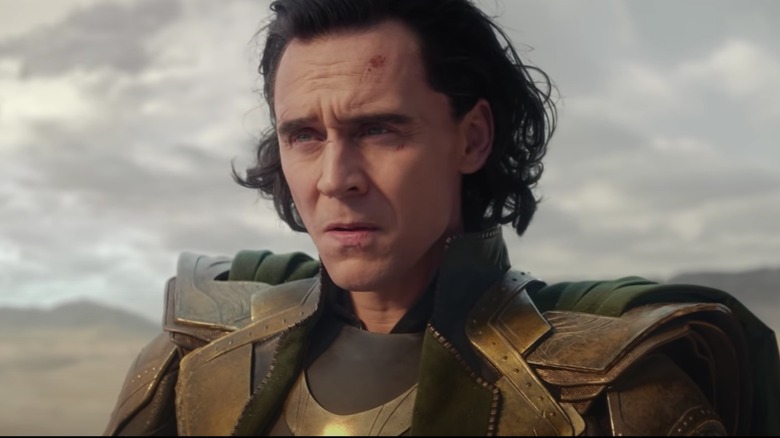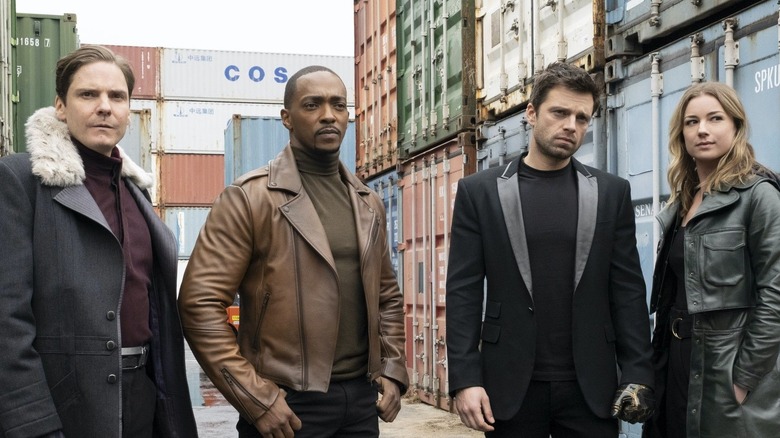How Marvel Decides Which MCU Characters Are Allowed In Shows Like Loki
The best (and worst) part of writing for the Marvel Cinematic Universe is that your movie/show is almost never just a self-contained story. It's part of a larger world, one where pre-existing characters can veer in and out of the narrative at seemingly any moment. But that's part of what made "Loki," the Disney+ series that began in June 2021, so fun. The main character was already established by several previous movies, so viewers knew who this guy was from day one, ad the first episode had a whole lot less work to do than a typical TV pilot.
So far, "Loki" hasn't involved any major characters from the main MCU, but part of the fun for fans is knowing that it could do so at any moment. It's hard to imagine a version of the series that doesn't at least have Loki somehow reconnect with his brother Thor, for instance, if even for just a scene or two in the final season. When it comes to minor Marvel characters, meanwhile, the possibilities are endless, and not just for "Loki." As Joanna Robinson wrote in her book "MCU: The Reign of Marvel Studios" published last year:
"Filling out their casts, they were allowed to pick from the vast array of preexisting Marvel characters. [Marvel President] Feige described the process on WandaVision: 'We wanted a scientist, or we needed a federal officer, and because we have so many amazing cast members over the years, well, this could be [Ant-Man character] Jimmy Woo. Do you think Randall Park would wanna come back and do it?' Feige also cited Kat Dennings, who played fan favorite Darcy Lewis in the Thor franchise, as someone who could slot into that scientist role... 'It is a privilege that they agreed to come in and continue to play in our sandbox.'"
The problem with sandboxes
But as the financial disappointments of recent Marvel properties have made clear, there are downsides to having all of your MCU properties exist within one giant sandbox. Whereas the goal of perpetually interconnected properties is that they'll all feel important, at a certain point the audience becomes so overwhelmed with new shows and movies that the opposite feeling takes effect. If everything's important, nothing is. If everything's part of a larger MCU, it's harder for each for each TV show and movie to have its own distinct voice to reel new viewers in.
Even though shows like "Hawkeye" and "Wandavision" had the freedom to bring minor pre-established characters into the narrative for fun surprises, that freedom was contingent on a ton of outside factors. "They give you this menu of characters that they're excited about," said Malcolm Spellman, head writer of "The Falcon and the Winter Soldier" when he was interviewed for "MCU: The Reign of Marvel Studios. "As you start to play with that menu, certain characters may disappear and new characters who you might have asked about — they said, 'No, no, you can't use them' are now available.'"
The result is that, if you want to be a head writer or director for any Marvel show or film, you basically have to accept going in that you're working "within Marvel's constraints," as Robinson put it. Don't get too excited for any character arcs you've got planned; the powers that be can change it at any moment. It may not be popular to point this out, as the backlash to Nia DaCosta's straightforward comments about "The Marvels" made clear, but it's true. There are great things to be found within the MCU, but if you're looking for an auteur director's unfiltered creative vision, it's best to look somewhere else.

